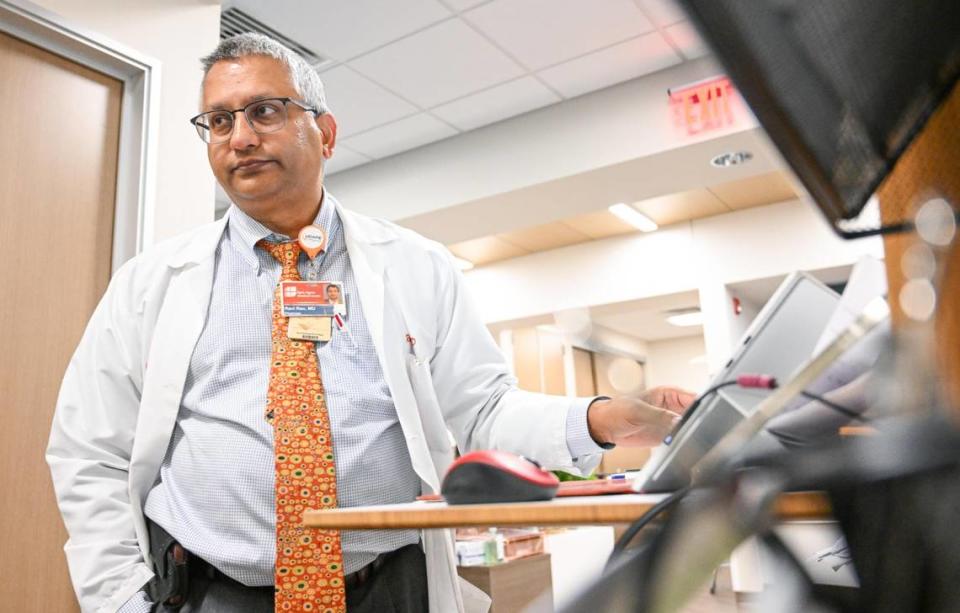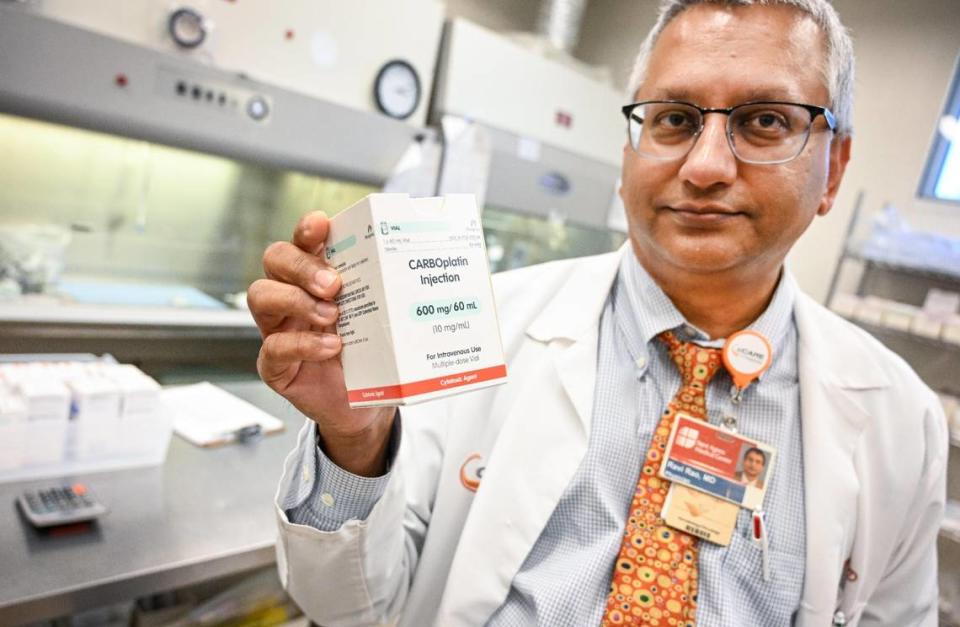‘Patients are suffering.’ Fresno cancer patients severely affected by chemo drug shortage
Dolores Leal-Martinez, 61, of Clovis, is due for her third cycle of chemotherapy at the end of this month, but she doesn’t know whether she’ll be able to get the critical life-saving treatment she needs amid a national shortage of two essential cancer drugs.
Leal-Martinez, a transitional kindergarten teacher in Sanger, was diagnosed with stage 3 ovarian cancer in late May after undergoing surgery to remove a 22-centimeter mass and having a total hysterectomy.
Part of her chemotherapy regimen includes a drug called cisplatin. But cisplatin and carboplatin, another chemotherapy drug, are in short supply.
The Food and Drug Administration added cisplatin to its drug shortage website on Feb. 10, and carboplatin on April 28.
The shortage of the drugs spread to the Fresno area about eight weeks ago and began affecting patients who have gone without those drugs or have been given more toxic alternatives.
Leal-Martinez was able to get cisplatin for her first two cycles of chemotherapy, but for her remaining cycles, her oncologist, Dr. Ravi Rao, told her they will have to wait and see. She needs a total of six chemotherapy cycles, and each consists of a three-day treatment. The thought of having her treatment altered in the middle of the process, she said, is “frightening.”
“Having the diagnosis is already hard enough,” she told The Bee. “It just adds an additional stress and pressure. I shouldn’t have to be dealing with that. It’s just devastating.”
The short supply of the chemo drugs was first reported by NPR and the New York Times. Intas Pharmaceuticals, the main manufacturer of the drugs, shut down its plant in India in December after an unannounced inspection by the Food and Drug Administration, the New York Times reported.
Either of the two drugs -- not used together -- is essential in treating ovarian, bladder and cervical cancers, among others, “but these are the top three, mainly because cisplatin and carboplatin are so critical in curing,” Rao said.
Another patient Rao is treating undergoes weekly treatments for bladder cancer. Carboplatin is one of the drugs included in his weekly chemotherapy regimen, but due to the shortage, the essential drug was missing from his treatment plan for a month. Rao finally decided to substitute a different chemotherapy drug.
That drug, mitomycin is effective, Rao said. But it is also more toxic and has a lot of side effects, especially for older patients.
Rao said he prescribed a lower than usual dose of mitomycin because of the patient’s age.
“But in spite of that, a week later, he ended up in the hospital with complications from chemotherapy,” Rao told The Bee.
Leal-Martinez said cancer patients do not need additional worries. But she can’t stop thinking about whether she’ll be able to finish her chemotherapy with cisplatin. She doesn’t know how her body would react to an alternative drug and how effective it would be.
“It’s hard to take it away from my mind,” she said.
Initially, Rao said, doctors at cCare - California Cancer Associates for Research & Excellence - where he works, were rationing cisplatin and carboplatin for patients who need curative treatment, but it was difficult because doctors don’t know when the sporadic shipments will arrive and what the amount will be.
“So we just give it to whoever is there on that day,” he said.
Leal-Martinez said the situation is also not fair for oncologists who are being placed in this predicament.
“The kind of pressure they are being put under to have to make those determinations,” she said. “So many patients and a limited amount of these drugs.”
On a recent Wednesday afternoon, Rao walked around one of the areas where the medication is stored. A small badge of carboplatin had arrived that morning.
“It will be gone by Friday,” he says. “Enough to treat 15 patients.”
Rao gets a weekly update from the pharmacy manager indicating how many patients are due to receive cisplatin and carboplatin each week at cCare. He scrolls down the list on his email: “This week, 47, again,” he says. That’s considered a large number for the amount of medication coming in. Additionally, the doses are based on a patient’s stature, so some may require more of the medication.

The prior week, the list also included 47 patients. This number doesn’t include cancer patients at other clinics throughout Fresno County. Other oncologists and cancer clinics in Fresno didn’t respond to inquiries from The Bee seeking comment, but Rao says they are all facing the same grim situation.
“It’s been my experience .... with my own patients, around one in three are getting it,” he said of the needed drugs. “It is devastating.”
FDA has ‘to realize how bad this is’
In late May, U.S. Sens. Gary Peters and Debbie Stabenow and U.S. Rep. Elissa Slotkin, all from Michigan, wrote a letter to FDA Commissioner Dr. Robert M. Califf. They urged the agency to do “everything in its power to alleviate the strain on patients and prevent delays in life-saving treatments” amid the shortage of cisplatin and carboplatin.
Alternate supplies were said to be arriving in the United States from China. But those supplies have yet to reach his office, Rao said.
“Patients are suffering. We are suffering. We are caught in the bind,” he said. “Patients are worried, they are upset, and we face the brunt of it.”

Rao said he would like for the FDA to take this “very seriously” and “to realize how bad this is.”
“To say, ‘OK, we need to solve this tomorrow,” he said. “There must be some place in the world where you can buy some extra carboplatin and ship it in.”
Chanapa Tantibanchachai, a press officer with the FDA, referred The Bee to a June 2 tweet by Califf in which he says the agency “recognizes the importance of a stable, safe supply of critical drugs used in oncology, especially those used in potentially curative or life-extending situations.”
“The FDA recognizes that a robust, resilient and safe drug supply chain is essential for public health and national security,” she told The Bee in an email. “The agency is fully engaged in cross-government discussions to identify potential policies and provide input on proposals informed by our current authorities, resources and industry knowledge to ensure meaningful solutions.”
Rao urged cancer patients, their family members and the community to call their local representatives in Congress and ask them to further push the FDA to address a problem that will result in avoidable deaths.
“This is a public good,” he said. “We need to make sure the system works well. Right now it’s not.”
Anthony Camacho, press secretary for U.S. Rep. Jim Costa, D-Fresno, said the congressman is concerned about this matter and is looking at federal actions, such as the FDA’s response.
“He is in contact with leaders on this issue to determine any actions needed by Congress to help alleviate these shortages,” he told The Bee in an email. “He is prepared to lend his support where necessary to ensure that patients have access to lifesaving drugs.”

